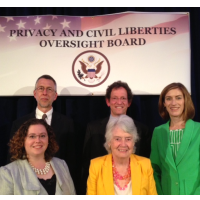Privacy Board Report on Mass Telephone Surveillance Divides on Party Lines

An independent government review panel appointed by President Barack Obama issued a divided opinion of the National Security Agency’s (NSA) mass telephone records surveillance program, which Obama has defended and critics have blasted.
The five-member Privacy and Civil Liberties Oversight Board (PCLOB) issued a report (pdf) that condemned the NSA’s collecting of Americans’ phone records. Contrary to Obama’s assertion that the Patriot Act (pdf) authorizes the program, the board concluded that the very same law makes it illegal to conduct such surveillance.
The report also found the program has not made the country safer from terrorism, and should be shut down.
These positions were not endorsed by all panel members. Two of them, Rachel L. Brand and Elisebeth Collins Cook, who served in the Justice Department under President George W. Bush, said the program should continue, albeit with modifications to ensure greater privacy protections.
But the other three members favored ending the NSA’s vast spying on domestic phone calls records. Those members were chairman David Medine, a former Federal Trade Commission official in the Clinton administration; James X. Dempsey, a public policy expert with the privacy group, the Center for Democracy & Technology; and Patricia M. Wald, a retired federal appeals court judge named to the bench by President Jimmy Carter.
“The Section 215 [of the Patriot Act] bulk telephone records program lacks a viable legal foundation under Section 215, implicates constitutional concerns under the First and Fourth Amendments, raises serious threats to privacy and civil liberties as a policy matter, and has shown only limited value. As a result, the Board recommends that the government end the program,” the report states.
The controversial program also has not helped protect the U.S., the board found.
“Based on the information provided to the Board, including classified briefings and documentation, we have not identified a single instance involving a threat to the United States in which the program made a concrete difference in the outcome of a counterterrorism investigation. Moreover, we are aware of no instance in which the program directly contributed to the discovery of a previously unknown terrorist plot or the disruption of a terrorist attack,” the board said.
The board examined a dozen terrorism cases cited by intelligence agencies that involved information which was obtained using Section 215, and largely dismissed them as irrelevant. In particular, the board addressed the case of Khalid al-Mihdhar, one of the 9/11 hijackers, which President Obama recently cited as an example of why the NSA phone data collection program should continue. That case was rejected by the board as well, noting that “the failure to identify Mihdhar’s presence in the United States stemmed primarily from a lack of information sharing among federal agencies, not of a lack of surveillance capabilities.”
Civil libertarians praised the board’s conclusions about closing down the program.
“Now two independent government panels, a bipartisan coalition in Congress, a federal judge sitting in open court, and the majority of the American public agree—the government’s bulk collection of everyone’s private phone records must end,” Nate Cardozo, an attorney with the Electronic Frontier Foundation, said.
Obama said last week that the program should continue, but in a different form, with the phone records stored outside of government hands and with more legal limitations on intelligence analysts’ ability to access the records.
-Noel Brinkerhoff
To Learn More:
Privacy Oversight Board Agrees with EFF: Mass Surveillance Is Illegal and Must End (Electronic Frontier Foundation)
Independent Review Board Says NSA Phone Data Program Is Illegal and Should End (by Ellen Nakashima, Washington Post)
Watchdog Report Says N.S.A. Program Is Illegal and Should End (by Charlie Savage, New York Times)
Report on the Telephone Records Program Conducted under Section 215 of the USA PATRIOT Act and on the Operations of the Foreign Intelligence Surveillance Court (Privacy and Civil Liberties Oversight Board) (pdf)
Do NSA's Bulk Surveillance Programs Stop Terrorists? (by Peter Bergen, David Sterman, Emily Schneider, and Bailey Cahall, New America Foundation)
Will the Federal Privacy Board Finally Do Something? (by Noel Brinkerhoff, AllGov)
- Top Stories
- Unusual News
- Where is the Money Going?
- Controversies
- U.S. and the World
- Appointments and Resignations
- Latest News
- Trump Orders ICE and Border Patrol to Kill More Protestors
- Trump Renames National Football League National Trump League
- Trump to Stop Deportations If…
- Trump Denounces World Series
- What If China Invaded the United States?






Comments